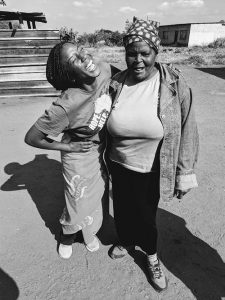 Due to the COVID-19 pandemic and stay-at-home orders, Wright State University Boonshoft School of Medicine (BSOM) students were not able to travel abroad this past spring or summer. Being “stateside” didn’t stop them from collaborating with The Luke Commission to serve the people in remote communities in Eswatini, formerly known as Swaziland, in southern Africa.
Due to the COVID-19 pandemic and stay-at-home orders, Wright State University Boonshoft School of Medicine (BSOM) students were not able to travel abroad this past spring or summer. Being “stateside” didn’t stop them from collaborating with The Luke Commission to serve the people in remote communities in Eswatini, formerly known as Swaziland, in southern Africa.
The Luke Commission (TLC) is an organization that works to deliver compassionate, comprehensive health care to isolated and underserved populations of southern Africa, in collaboration with local communities, government, corporate and nonprofit partners.
As part of a spring elective course, Supporting Global Health Organizations in their COVID-19 Response, third-year medical students Stephanie Hearne, Sierra Lindsey and Musunga Mulenga worked with fourth-year medical students Katie Lomeo and Autumnn Merrill. They formed a task force aimed at understanding the needs of TLC during the pandemic. Mulenga was the team’s primary liaison with TLC, and Lindsey was the liaison with School of Medicine instructors.
The students also used the experience to learn how to formally conduct a needs assessment.
“It was a three-page questionnaire for TLC to fill out, to assess what areas they needed help with,” said Lindsey. “They sent us a list of topics they wanted teaching tools for, and we asked the priority level for each topic and what materials they wanted developed.”
From the needs assessment, the students began creating training tools in the form of PowerPoint presentations, games and handouts for TLC health care workers and VIPs. “At TLC, all patients are regarded as “Very Important Patients,” a.k.a. VIPs,” said Mulenga.
“Being able to work with TLC, to develop training materials to help with COVID-19 patient care, really made it feel like we could make an actual difference during this pandemic. Even if we were not there in person, it was nice to play a role from thousands of miles away,” said Lindsey.
The training tools covered COVID-19, when and how to self-isolate, and other topics such as disaster preparedness, IV insertion and IV sets, and arterial blood gas testing and management.
In a typical year, as part of the Global Health Scholars Program, students help TLC’s work by traveling to Eswatini and working with physicians on the TLC campus and throughout Eswatini. Students see patients and learn how to diagnose, treat and manage illnesses. The Global Health Scholars Program is led by Kate Conway, M.D., assistant professor of family medicine.
The opportunity to work in global health was one of the biggest reasons that Mulenga chose to attend BSOM. She appreciated the opportunity to serve and learn in Eswatini. Mulenga was born in Zambia and grew up in Blackwood, New Jersey.
The elective course provided an opportunity for the students to continue the work and maintain the partnership between BSOM, Eswatini and TLC.
“This elective allowed me to feel like I was able to do something during this pandemic, even if small, for an organization that I truly love and respect,” said Merrill. Merrill and Lomeo traveled to Eswatini in 2018.
“Traveling to Eswatini was such a great experience, and I’m glad I was able to contribute my knowledge and skills in continuing to serve TLC in this capacity,” said Mulenga, who traveled to Eswatini with Lindsey in 2019.
More training tools are being created by second-year medical students who were scheduled to travel to Eswatini this year but couldn’t because of COVID-19. These tools will cover topics such as mechanical ventilation, ICU equipment use and management, and psychological and spiritual support for health care workers.

 Wright State names Rajneesh Suri dean of Raj Soin College of Business
Wright State names Rajneesh Suri dean of Raj Soin College of Business  ‘Only in New York,’ born at Wright State
‘Only in New York,’ born at Wright State  Wright State president, Horizon League leaders welcome new commissioner
Wright State president, Horizon League leaders welcome new commissioner  Wright State celebrates homecoming with week-long block party
Wright State celebrates homecoming with week-long block party  Wright State baseball to take on Dayton Flyers at Day Air Ballpark April 15
Wright State baseball to take on Dayton Flyers at Day Air Ballpark April 15 